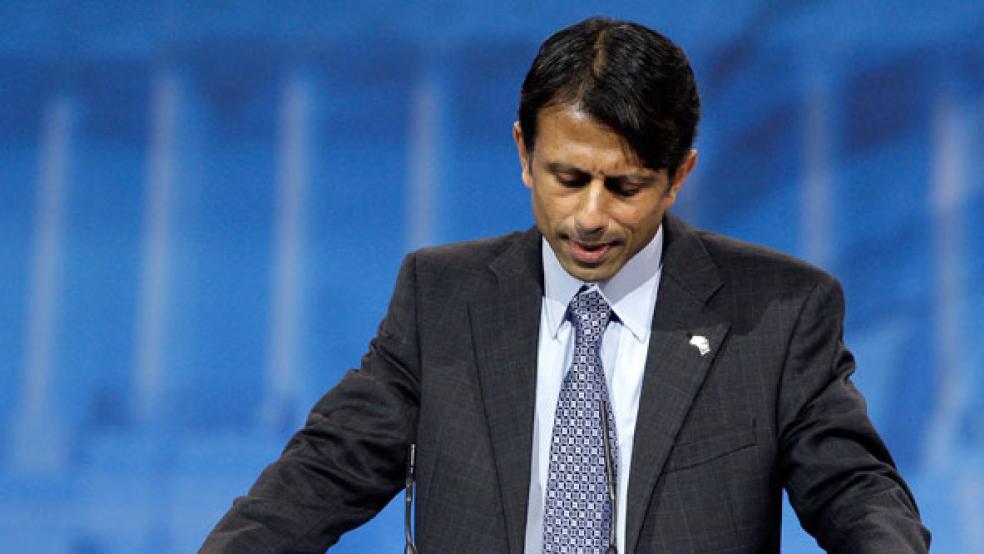Louisiana Gov. Bobby Jindal has been a rising star in the Republican Party for some years. But this year he made a serious misstep on reforming the state’s tax system that has national implications, reducing the chances of tax reform in Washington.

To begin with, it is important to recognize that conservatives have been the driving force behind tax reform since the early 1980s. From the early 1960s through the late 1970s, liberals drove tax reform. Their goal was to increase progressivity, mainly by eliminating tax loopholes for rich people and big corporations. They were largely successful, enacting tax reform bills in 1969 and 1976 – both signed into law by Republican presidents – that went a long way toward achieving their goal.
Conservatives were largely absent from this debate, mainly because they had no vision of an ideal tax system to which they could aspire. But this changed when the idea of the flat tax came on the scene in 1981, when two Stanford professors proposed a postcard-size tax return for both individuals and businesses, which would all be taxed at a single rate.
Republicans seized upon the flat tax and came close to achieving it with the Tax Reform Act of 1986, which lowered the top rate on individuals to 28 percent and had just one lower rate of 15 percent. It was financed in a revenue-neutral manner by closing tax loopholes, mainly for corporations.
But as early as 1990, the quasi-flat tax began to fall apart when President George H.W. Bush agreed to add a new top rate of 31 percent beginning in 1991 as part of a budget deal, creating three tax brackets. In 1993, President Bill Clinton added an additional two brackets of 36 percent and 39.6 percent, raising the total to 5 brackets. Neither Bush nor Clinton restored any of the tax loopholes that were part of the 1986 deal.
In 1996, Republican presidential candidate Steve Forbes revived interest in the flat tax among Republicans. Although he was unsuccessful, the flat tax has remained the Republican ideal ever since.
Another important aspect of Republican tax theory has been to have a tax bases consisting largely of consumption, which would necessarily exempt taxation of interest, dividends and capital gains. Liberals generally favor the income tax and support broadening it to include forms of income that are taxed at lower rates, such as dividends and capital gains, or not taxed at all, such as employee fringe benefits.
Since 1986, liberals have been largely absent from the tax reform debate. I think they have had their hands full just preventing the enactment of more Republican tax cuts that would further reduce progressivity. Lately, they have been preoccupied with trying to raise additional revenue against strenuous Republican resistance.
Republicans have been stymied as well at the national level and sought to advance their tax ideal at the state level. A conservative group called the American Legislative Exchange Council has spearheaded efforts to cut tax rates on the wealthy and corporations, based on the ideas of the economist Arthur Laffer and the Wall Street Journal editorial writer Steve Moore.
In January, Gov. Jindal proposed a tax reform that conformed to the Republican ideal, which he hoped would make him a contender for the 2016 Republican presidential nomination. It would have completely eliminated the state’s corporate and individual incomes taxes, replacing the revenue with an increase in the state sales tax to 7 percent from 4 percent.
The Institute on Taxation and Economic Policy, a liberal think tank, charged that the Jindal plan would raise taxes on the bottom 80 percent of Louisiana citizens. Conservative tax guru Grover Norquist of Americans for Tax Reform cheered the Jindal plan, calling it “the gold standard for pro-growth reform.”
But the Jindal plan was not received well, even in conservative Louisiana. An April 2 poll from Southern Media & Opinion Research found a sharp drop in Jindal’s popularity to 38 percent from 51 percent in October. His tax reform was opposed by 63 percent of Louisianans and supported by just 27 percent. Even among Republicans, fewer than half supported the Jindal tax plan.
On April 8, Jindal admitted defeat and withdrew his tax reform. Bloomberg’s Josh Barro said that Jindal had overreached, noting that over the last 50 years only one state, Alaska, had abolished a major state tax, which oil revenue allowed it to do.
I believe that Jindal’s failure not only diminishes his presidential hopes, but also reduces the chances for tax reform in Washington. It is inevitable that if Republicans propose a plan anything like it, it will be compared to Jindal’s and it will be declared dead on arrival.
Unfortunately, tax reform requires idealists to push a specific proposal past the inevitable phalanx of lobbyists determined to protect any provision of the tax code benefitting their business or constituency and, if possible, add new ones. TheNational Association of Realtors, for example, has been running advertisements for months on why politicians shouldn’t even think about tampering with the mortgage interest deduction.
Since liberals still seem largely absent from the tax reform debate and with the Obama administration focused narrowly on a laundry list of specific tax changes, lacking any unifying principle, I don’t see where the impetus for tax reform will come from.
House Ways and Means Committee Chairman David Camp (R, Mich.) and Senate Finance Committee Chairman Max Baucus (D, Mont.) talk bravely about doing tax reform this year, but are starting from a blank slate. Just getting a draft proposal that both can agree to will take considerable time and work.
I fear that tax reform, like so many other big ideas in Washington, will simply be an excuse to soak the corporate community for campaign contributions. The sad fact is that it is a win-win for members of Congress in both parties, as well as corporate lobbyists. The only losers are everyone else.






